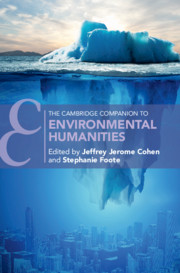Book contents
- The Cambridge Companion to Environmental Humanities
- The Cambridge Companion to Environmental Humanities
- Copyright page
- Contents
- Notes on Contributors
- Acknowledgments
- Chronology
- Chapter 1 Introduction: Climate Change/Changing Climates
- Chapter 2 The Commons
- Chapter 3 Rights
- Chapter 4 Time as Kinship
- Chapter 5 The Nature of Gender
- Chapter 6 Race, Health, and Environment
- Chapter 7 Narrative and Environmental Innovation
- Chapter 8 Climate Fictions: Future-Making Technologies
- Chapter 9 Apocalypse/Extinction
- Chapter 10 Multispecies
- Chapter 11 Food
- Chapter 12 Plants
- Chapter 13 Extraction
- Chapter 14 Ice/Water/Vapor
- Chapter 15 Rocks
- Chapter 16 Coal/Oil
- Chapter 17 Waste
- Chapter 18 Ecomedia
- Chapter 19 New Materialism and the Nonhuman Story
- Chapter 20 Risk
- Chapter 21 Coda: Virus
- Bibliography
- Index
- Cambridge Companions To Literature
- References
Chapter 9 - Apocalypse/Extinction
Published online by Cambridge University Press: 12 August 2021
- The Cambridge Companion to Environmental Humanities
- The Cambridge Companion to Environmental Humanities
- Copyright page
- Contents
- Notes on Contributors
- Acknowledgments
- Chronology
- Chapter 1 Introduction: Climate Change/Changing Climates
- Chapter 2 The Commons
- Chapter 3 Rights
- Chapter 4 Time as Kinship
- Chapter 5 The Nature of Gender
- Chapter 6 Race, Health, and Environment
- Chapter 7 Narrative and Environmental Innovation
- Chapter 8 Climate Fictions: Future-Making Technologies
- Chapter 9 Apocalypse/Extinction
- Chapter 10 Multispecies
- Chapter 11 Food
- Chapter 12 Plants
- Chapter 13 Extraction
- Chapter 14 Ice/Water/Vapor
- Chapter 15 Rocks
- Chapter 16 Coal/Oil
- Chapter 17 Waste
- Chapter 18 Ecomedia
- Chapter 19 New Materialism and the Nonhuman Story
- Chapter 20 Risk
- Chapter 21 Coda: Virus
- Bibliography
- Index
- Cambridge Companions To Literature
- References
Summary
Over the past two centuries, apocalypse and extinction have become powerful secular tropes, and have been given new urgency in the context of escalating global heating and biodiversity loss. This chapter examines how the environmental humanities can analyse, complicate, democratise, and challenge these tropes. It addresses present-day speculations about the future of the biosphere, both within the field, and in wider culture through the activities of groups such as Extinction Rebellion. It explores the entanglements of these speculations with questions of justice, and offers an analysis of relationships humanity, inequality, and catastrophe in Mary Shelley’s novels Frankenstein (1818) and The Last Man (1826). The chapter ends with some suggestions about the role of the environmental humanities in an ecological emergency. In particular, it addresses how the field might contribute to the communal task of finding urgent solutions for social-environmental problems, while at the same time maintaining focus on issues of justice and rigorous critique of totalising narratives, including the language of solutions and of apocalypse itself.
Keywords
- Type
- Chapter
- Information
- The Cambridge Companion to Environmental Humanities , pp. 114 - 127Publisher: Cambridge University PressPrint publication year: 2021
References
Further Reading
- 1
- Cited by

